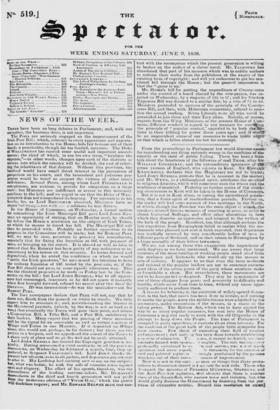NEWS OF THE WEEK.
The Peers are seriously engaged on the improvement of the Irish Poor Bill; which, contrary to every appearance awl expecta- tion on its introduction to the House, bids fair to come out of their hands a practicable, though far too limited, measure. The Duke of WELLINGTON has carried some useful and important amend- ments; the chief of which, to use his own term, "localizes the elpense,"—in other words, charges upon each of the districts or unions into which the country will be divided, the cost of reliev- ing the inhabitants of that district. Without this provision, the landlord would have small direct interest in the prevention of pauperism on his estate, and the benevolent and judicious pro- prietor would be taxed to support the victims of other men's selfishness, Several Peers, among whom Lord FITZGERALD is conspicuous, are anxious to provide for emigration on a large scale: but Ministers are indifferent or averse to this necessary auxiliary to the bill; and we regret to see that the Duke of 1VEL- eulerom does not comprehend its bearing. The measure is in his bands; for, as Lord BROUGHAM observed, Miiiitters have no choice huVenruplience with ele e nditiuns he may dictate. In the House of Commons, on Wednesday, a formal motion for committing the Irish Municipal Bill gave Lord *JOHN Rus- SELL an opportunity of stating, that on Monday next, he should lay before the House a resolution on the subject of Irish Tithes. on which lie means to found his bill. 'The Municipal Bill will then be proceeded with. Probably no further opposition to its progress in the Committee will be made; but Sir ROBERT PEEL will, we may be sure, persevere in pressieg his amendments, especially that for fixing the franchise at 101. with payment of ales, on bringing up the report. It is absurd as well as false to pretend that Sir Rammer has been guilty of any unfairuess or in- consistency in his course on this occasion. In terms distinct and dogmatical, when Ile stated the cunditions on which he would " settle the Irish questions," be anthmuced his intention to have the uniform franchise of 101. tested by the poor. rate, or, if the Poor Bill should not pass, in some equally efficacious way. This was the identical proposition he made en Friday last to the Com- mittee on the bill : but Lord JOHN RUSSELL, who to all appear- ance had encouraged, inasmuch as he did not spurn it instantly when first brought forward, refused his asseut &trier two dava' des liberalion. Hewes inconsistent—he was the unisleader—not Sir Roemer PEEL.
The Tort newspapers declare that PEEL will not, nay that he dares not, flinch from the ground on which he stands. We fully expert him to maintain it ; and, notwithetandine the bluster in the Ministerial journals, (which, by the way, is nut so loud as it wane that eventually the Tories will gain their point, awl obtain a Corporation Bill, a Tithe Bill, and a Pour Bill, satisfactory to their leaders. Many expect that the passing of these meusures will he the signal for an ostensible as well us virtual coalition of Whigs and Tories in one Ministry. If It depended on Whigs alone, thi3 would riot, perhaps, be far distant ; but there are two parties to a bargain, and we uppothend the assent of the Tories to a share only of place and its pr fits will nut be easil. obtained. .Lord JOHN RusseLL has treated the Cupyrigiit genitemen nit- kindly. Having maintained it strict neutrutile in all the pre, i bus discussions, on Wednesday he delivered a seeeele ratal. they op. prebend, to Sergeant TeLeouen's bill. Lord JOHN think; the Present law advantaeeous to all parties, and &peewee any attempt to alter it. His Lordship had nothing new tu say Oil the eubject; bat, what was better, he took the litde of connuoa sense ugainet cant and cliquery. The effeet of his speech, therefore, was the discomfiture of the trading eentimeetithets. Mr. DemeeLfs deseewlants in the third and fourth geneimiun will nut profit front the numerous editions of" Vivian G.ey," which tint public Wilidoubtiess require; and Mr. EDWARD BULWRR 111U61 teat ems - tent with the recompense which the present generation is willing to bestow on the author of a clever novel. Mr. TALFOURD has abandoned that part of his measure which was to entitle authors to reclaim their works from the publishers at the expiry of the existing term of copyright: and will yet endeavour to get his mu- tilated bill through the House ; but the general impression is that the "game is up." Mr. Hume's bill for putting the expenditure of County-rates under the control of a board elected by the rate-payers, was re- jected on Wednesday, by a majority of 105 to 37; and his Election Expenses Bill was doomed to a similar fate, by a vote of 71 to 43. Ministers pretended to approve of the principle of the County- rates Bill, and then, with Hibernian consistency, refused to sanc- tion the second reading. Seven Liberals were all who could be persuaded to join them and their Tory allies. Nobody, of course, expects from the Whig Ministers, or the present House of Corn- moos, different conduct in regard to any measure for exteging the principle of "popular control," appealed to by both thiefet- tions in their bidding for power three years ago : and it wouTd" be an improvident abuse of our resources to waste noble angel- - on that which is fallen almost too low for contempt.


























